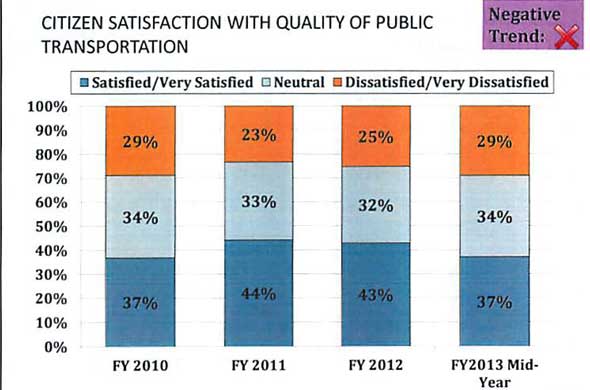
About one fourth of Kansas City residents use buses, a city council committee heard yesterday, but a 29 percent dissatisfaction rate may mean there is a demand for additional service. As the city discusses the future of funding for buses, streetcars and other services, it faces decisions about how to finance buses along with the other forms of transit.
At a time when transportation tax funds are under scrutiny, a Tuesday Kansas City Area Transportation Authority (KCATA) report said bus ridership is up and a fourth of residents say they use buses.
Increased ridership brings the city more revenue, but fares only cover 16 percent of bus operating costs. So Mayor Sly James asked a hard question.
“Does the increase in revenue offset the expense necessary to service the increase (in riders?)”
Danny O’Connor, KCATA planning director, answered, “No, it does not.”
He reported the bus situation Tuesday to the mayor and city manager.
From 2010 to 2012, their ridership grew 4.6 percent a year for a total of 9.3 percent, compared to 1.3 percent increase a year nationwide.
But KCATA officials say they have long used revenue reserves to keep buses running and without more money those reserves will be gone by about 2018, forcing cutbacks in service.
A city study group is to report this summer on how to allocate transportation tax funds between buses, streetcars, and road maintenance and other services.
On Tuesday, the mayor asked O’Connor about a citizen survey in which 29 percent said they were not satisfied with the quality of public transportation. O’Connor said that is “a request for more of it.”
Much of the bus rider increase in the last two years is young people, he said, including 750 riders on weekdays from the University of Missouri -Kansas City.
“It is this young demographic that wants to live, work and play in the city,” he said.
But James said members of the Silver Haired City Council also raised concerns Monday about a lack of buses and public transportation.
“As we become a much older city and society, that’s going to be a huge issue,” James said.
Advocates for people with disabilities have also pushed for more public transit and say the vast majority of all people will need it as they age.
David H. Westbrook, who is blind and chairs the Mayor’s Committee for People with Disabilities, said in a recent budget hearing that disabled people call those who are not TABA – “temporarily able-bodied adults.”
Previous posts



Who’s talking